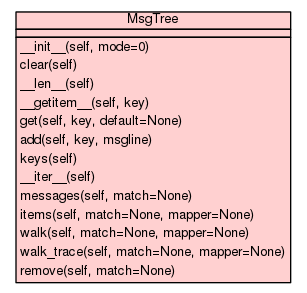MsgTree maps key objects to multi-lines messages.
MsgTree is a mutable object. Keys are almost arbitrary values (must be
hashable). Message lines are organized as a tree internally. MsgTree
provides low memory consumption especially on a cluster when all nodes
return similar messages. Also, the gathering of messages is done
automatically.
|
|
|
|
|
clear(self)
Remove all items from the MsgTree. |
source code
|
|
|
|
__len__(self)
Return the number of keys contained in the MsgTree. |
source code
|
|
|
|
|
|
|
get(self,
key,
default=None)
Return the message for key if key is in the MsgTree, else default. |
source code
|
|
|
|
add(self,
key,
msgline)
Add a message line associated with the given key to the MsgTree. |
source code
|
|
|
|
_update_keys(self)
Update keys associated to tree elements (MODE_DEFER). |
source code
|
|
|
|
keys(self)
Return an iterator over MsgTree's keys. |
source code
|
|
|
|
__iter__(self)
Return an iterator over MsgTree's keys. |
source code
|
|
|
|
messages(self,
match=None)
Return an iterator over MsgTree's messages. |
source code
|
|
|
|
items(self,
match=None,
mapper=None)
Return (key, message) for each key of the MsgTree. |
source code
|
|
|
|
|
|
|
|
|
|
|
|
|
remove(self,
match=None)
Modify the tree by removing any matching key references from the
messages tree. |
source code
|
|
|
Inherited from object:
__delattr__,
__format__,
__getattribute__,
__hash__,
__new__,
__reduce__,
__reduce_ex__,
__repr__,
__setattr__,
__sizeof__,
__str__,
__subclasshook__
|

